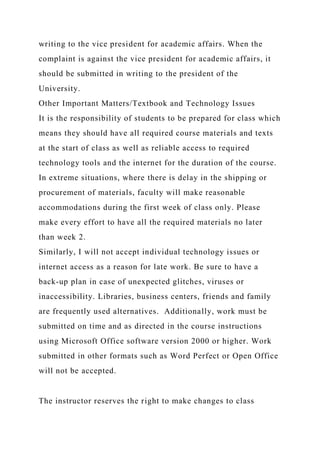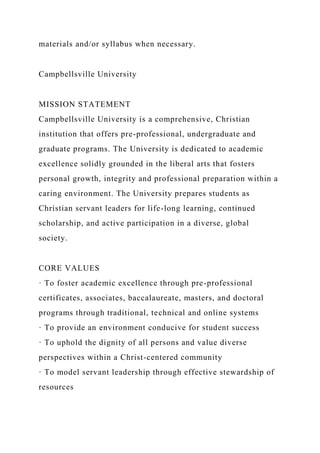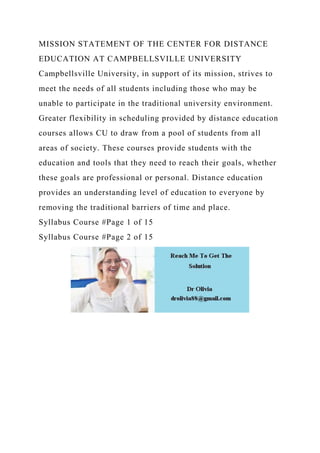The BA 606 Team Management course, taught by Dr. Jane Corbett, runs from October 15, 2018, to March 3, 2019, and focuses on the psychological contract between leaders and followers. The course includes online discussions, assignments, and exams centered around teamwork dynamics and leadership effectiveness, requiring participation and technical proficiency in platforms like Moodle. Students must complete all activities on time, engage in meaningful discussions, and achieve at least a 'C' grade to pass the course, which consists of various graded components including quizzes, discussions, and team assignments.
![BA 606 Team Management
Hybrid Course
Instructor Information
Name: Jane Corbett, PhD
Email: [email protected] (preferred method of contact)
Office Location: Remote
Dates: October 15, 2018 – March 3, 2019
Course Information
Course Number: BA 606 73 H2
Course Name: Team Management
Credits: 3
Format: This class will be delivered online using Moodle
Platform. Class sessions will consist of
discussions, assignments, and exam. Discussions,
assignments, cases and exam will
focus on readings, and other
professionally/academically reviewed journals.
Course Description:
Course Description: This course will explore the psychological
contract between leader and follower that take many forms
between two people or between the leader and groups. Students
will study group formation and group development as well as
the intricacies of coaching, mentoring, and disciplining.
Course Objectives & Learning Outcomes
Upon completion of the course, students should be able to:
1. Analyze the importance of working together collaboratively.
2. Improve your analytic abilities in understanding the behavior
of individuals](https://image.slidesharecdn.com/ba606teammanagementhybridcourseinstructorinformationn-230108014751-bb7f6a55/75/BA-606-Team-ManagementHybrid-CourseInstructor-InformationN-docx-1-2048.jpg)
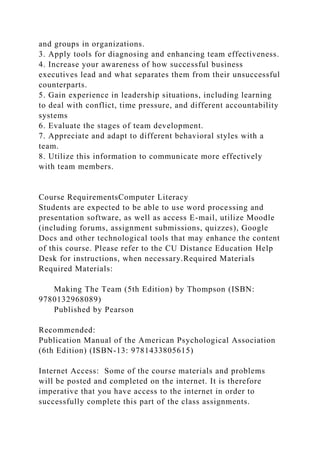
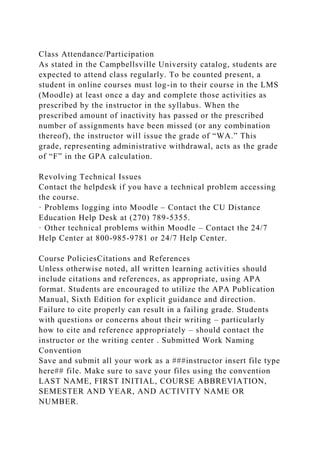
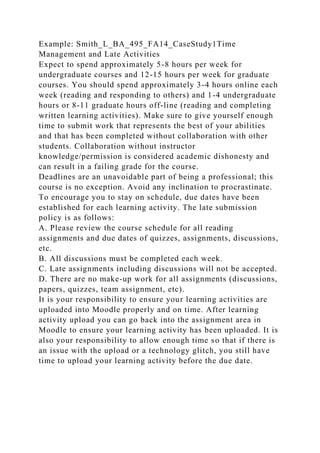
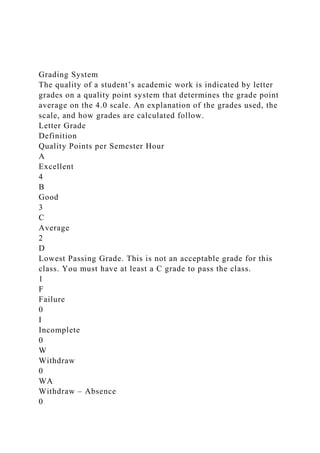
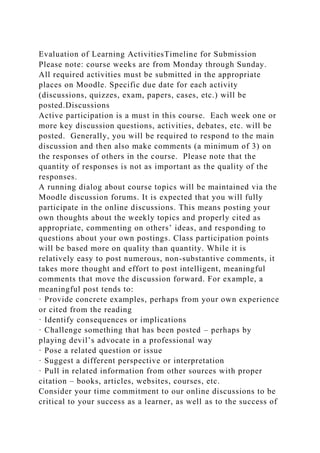
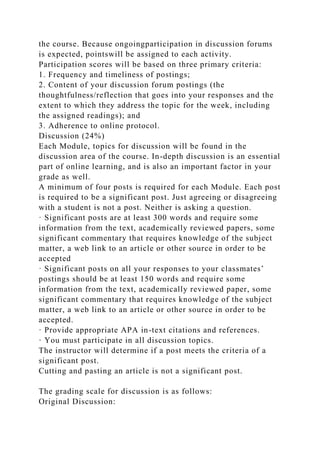
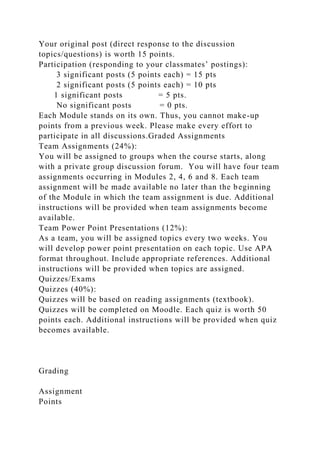
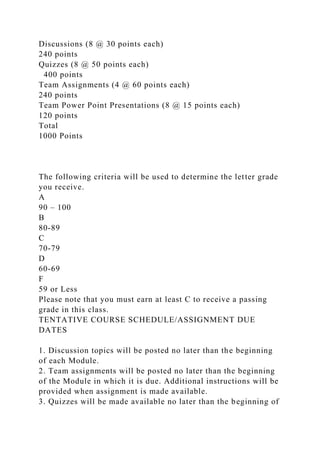
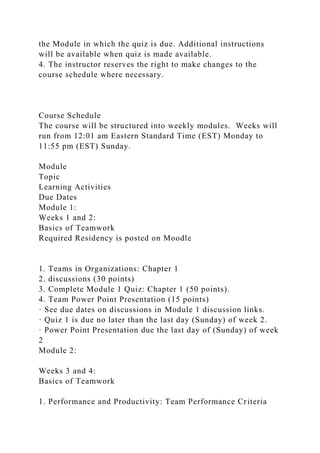
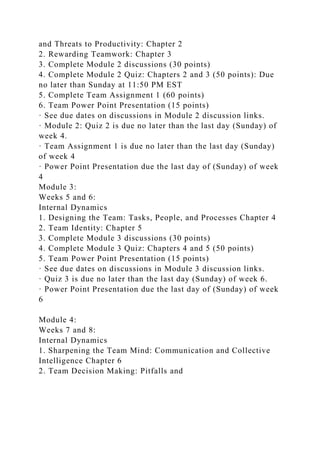
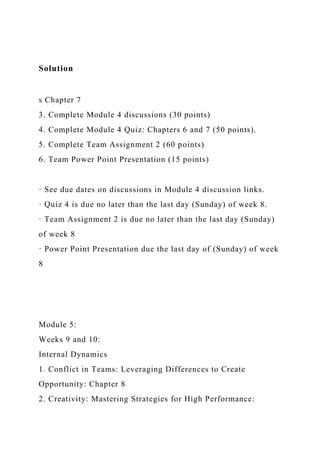
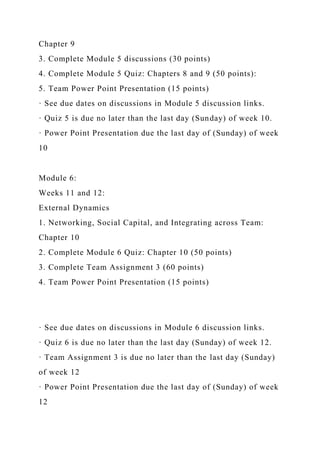
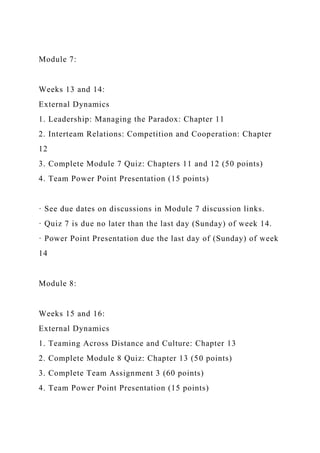
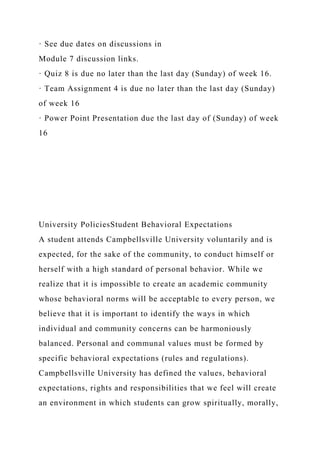
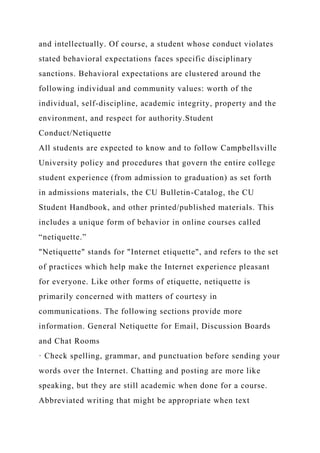
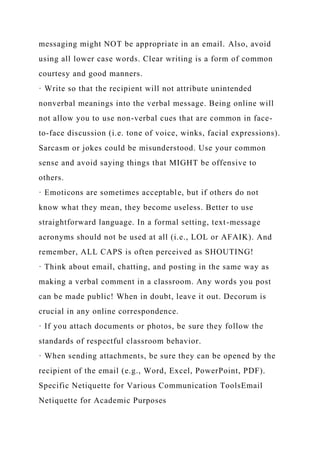
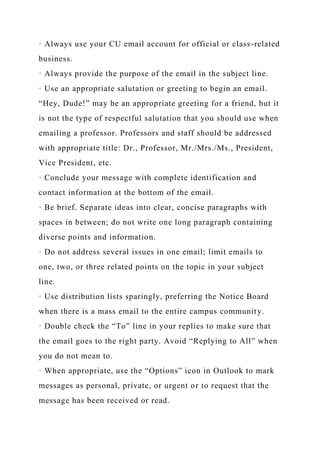
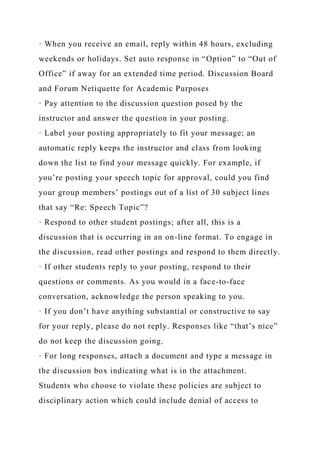
![courses, suspension, and expulsion.Academic Integrity
Each person has the privilege and responsibility to develop
one’s learning abilities, knowledge base, and practical skills.
We value behavior that leads a student to take credit for one’s
own academic accomplishments and to give credit to other’s
contributions to one’s course work. These values can be
violated by academic dishonesty and fraud.
Academic honesty is essential to the maintenance of an
environment where teaching and learning take place. It is also
the foundation upon which students build personal integrity and
establish standards of personal behavior. Campbellsville
University expects and encourages all students to contribute to
such an environment by observing the principles of academic
honesty outlined in the Bulletin Catalog and the Online Student
Handbook.Title IX
Campbellsville University and its faculty are committed to
assuring a safe and productive educational environment for all
students. In order to meet this commitment and to comply with
Title IX of the Education Amendments of 1972 and guidance
from the Office for Civil Rights, the University requires all
responsible employees, which includes faculty members, to
report incidents of sexual misconduct shared by students to the
University’s Title IX Coordinator. Please contact the Title IX
Coordinator, Terry VanMeter, at 270-789-5016 or
[email protected].](https://image.slidesharecdn.com/ba606teammanagementhybridcourseinstructorinformationn-230108014751-bb7f6a55/85/BA-606-Team-ManagementHybrid-CourseInstructor-InformationN-docx-20-320.jpg)
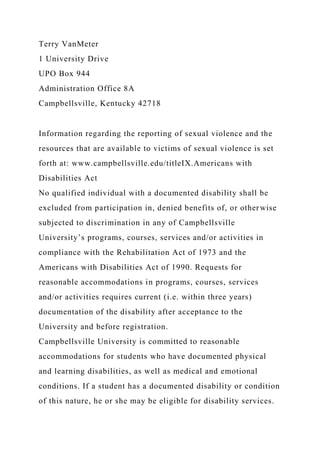
![Documentation must be from a licensed professional and current
in terms of assessment (within the last 3 years). Please contact
the Coordinator of Disability Services, Teresa Elmore, at (270)
789-5192 [email protected] or Ashley Abner at (270) 789-5450
[email protected] to inquire about services.Verification of
Disability
The Coordinator of Disability Services will ask for
documentation to verify the disability, and if appropriate, will
cooperate with instructors and Academic Support services to
facilitate and track accommodations and services.
No accommodation will be provided without documentation. In
addition, Campbellsville University will be unable to provide
accommodations in the classroom if the student does not give
permission to notify faculty that accommodations are needed.
Information regarding a student’s disability is considered
confidential. Information will not be released to anyone without
the express written permission of the student. Reasonable
Accommodations:
· Accommodations are provided on an individual basis.
· Accommodations are provided to support the educational
development of students with disabilities.
· In addition to the academic support services available to all
Campbellsville University students, some examples of
reasonable accommodations include extended time for tests,
administration of oral test, note-taking assistance, and use of](https://image.slidesharecdn.com/ba606teammanagementhybridcourseinstructorinformationn-230108014751-bb7f6a55/85/BA-606-Team-ManagementHybrid-CourseInstructor-InformationN-docx-22-320.jpg)
![assistive devices such as calculators or computers.Disability
Services
Within the office of Career Services, accommodations are
provided for students with disabilities. Helping remove barriers
is the goal of Disability Services. Students who have a
documented physical, psychological, emotional, and/or learning
disability can work with Career Services to receive necessary
accommodations. Students who want to inquire about required
documentation and possible accommodations may contact the
office of Career Services by calling (270) 785-5192 or emailing
Teresa Elmore [email protected] or Ashley Abner at
[email protected]. Official Email
The @campbellsville.edu extension will be considered the
official e-mail address for writing and forwarding electronic
correspondence.Academic Appeal and Complaint Process
A student may appeal the fairness of any academic action or
register a complaint, including a course grade, to the Academic
Council following consultation with his/her advisor, the
professor, and the appropriate department chair and/or the dean.
Such an appeal must be submitted in writing to the vice
president for academic affairs by end of the regular semester
after the semester in which the action was taken. The Academic
Council will then determine whether a hearing is necessary. The
decision of the Academic Council is final. Student complaints
other than appeals for course grades should be submitted in](https://image.slidesharecdn.com/ba606teammanagementhybridcourseinstructorinformationn-230108014751-bb7f6a55/85/BA-606-Team-ManagementHybrid-CourseInstructor-InformationN-docx-23-320.jpg)
